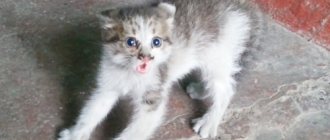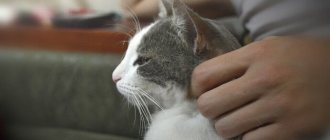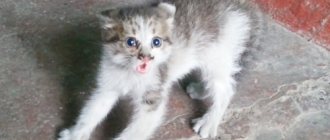Cats are quite capricious, freedom-loving, independent animals. Each individual, even within the same breed, has its own disposition, temperament, habits, and character. Some mustaches constantly require the attention of their owners and literally do not get off the laps or hands of their beloved owner, others are reluctant to make contact with a person and allow themselves to be stroked and cuddled only when they have the desire and the mood. How to raise an affectionate, easy-going pet? How to accustom a kitten to being held? You will learn the answers to these questions from this article.
Why does the kitten not want to sit in your arms?
Unfortunately, not all small kittens are happy to sit quietly and spend time in the arms of their owner, especially in stressful situations or if the pet is very scared. In addition, not all furry cats require increased attention and avoid close contact with humans. This applies not only to wild street adult cats, cats of certain breeds, but also to kittens that you came out of a helpless little lump. But you really want to cuddle and caress your beloved pet.
Cats tend to be arrogant. In most cases, cats allow themselves to be loved, accept our care, guardianship, and attention. Even a small kitten will not always sit quietly in your arms, allowing itself to be squeezed for hours. Remember that cats are very capricious and freedom-loving animals.
Why don't cats like to be held? The reasons for this behavior may be the following:
- Breed characteristics , genetic predisposition.
- Fear of heights, loss of balance. There are cats that are afraid of heights, weightlessness and do not like balance. Sitting in your arms, the kitten experiences fear and discomfort.
- Incorrect socialization, adaptation.
- Frequent stressful situations , mobile type of nervous system. If the cat is frightened or has suffered severe stress, even the calmest kitten, experiencing anxiety, will try to escape from the hands and run to a safe place.
- Rough treatment of animals. Cats remember their abuser very well, and if you used physical violence, the pet will no longer fully trust you.
- Strong unpleasant odors , according to the cat, emanating from the owner and his hands. Cats do not like the aroma of perfumes, especially citrus notes, or the smell of tobacco. Perhaps you have previously petted another cat or dog and the smell of the “stranger” scares the kitten away.
Why is my cat afraid of an outstretched hand?
Some cat owners notice that their cats do not always behave adequately, from a human point of view, when their owner wants to show affection towards them. There can be a lot of options for such oddities, but in this article we will consider only one of them. This is an inexplicable fear of cats of outstretched fingers, which appears especially clearly when the owner extends such an outstretched hand to his pet.
So, the owner decided to caress the cat and extended his hand to its face, spreading his fingers slightly, and she suddenly begins to get scared, run away, or even behave aggressively - scratch, fight back, or prepare for a retaliatory attack.
The cat is afraid of an outstretched hand.
At the same time, the rest of the time the cat behaves quite friendly. If such a reaction to an outstretched hand does not appear for the first time, then it is not at all difficult to assume that the issue is not some shortcomings in the relationship between the cat and the owner, and not shortcomings in upbringing, but simply a specific reaction to such an irritant. Accordingly, you don’t need to be Pythagoras or Lobachevsky to understand that this body language gesture, which is used by cats much more actively than any other, means a manifestation of hostility. In this case, usually just stop making such gestures and everything will return to its place.
Scared cat.
The fact is that cats perceive people as very strange, bizarre, huge, but still cats, as members of the cat family in which they themselves once grew up. And when cats decide to sort things out by physical confrontation, they often, instead of rushing into a fight without any warning, first extend their paws in each other's direction with their claws outstretched.
Sometimes you can observe scenes when cats preparing for a fight, having assumed aggressive poses in front of each other, begin to mutually demonstrate their military weapons - claws and fangs, thereby wanting to show that their claws are stronger and larger than the claws and fangs of the enemy. In fact, these aggressive cat "war dances" serve the cause of peace rather than the cause of war. The fact is that in addition to the mechanism of aggression, nature has also built into animals a mechanism for restraining aggression.
What is a cat afraid of?
The general public knows almost nothing about this mechanism. Moreover, most people hold views that fundamentally contradict this, it must be said, one of the main mechanisms. The majority of homo sapiens firmly believe that all predators are very aggressive by nature, and not only towards their victims, but also towards other predators (including their own kind), especially if they are their competitors. And the better armed a predator is, the more threatening its weapon is, the more aggressive it should be. It would seem that there is a certain logic in such reasoning - after all, if nature has endowed, say, wolves with powerful jaws, which no dog’s jaw can compare with, then they should be used for their intended purpose. In addition, most people have an extremely primitive understanding of Charles Darwin's evolutionary theory, in particular the mechanisms of natural selection. The broad masses have, in fact, adopted only one and, moreover, a highly distorted position - “the survival of the fittest,” although in fact this mechanism is much more complex than the endless determination of who is stronger.
Why are cats afraid of an outstretched hand and try to hide?
In reality, things are as follows: animal psychologists have long noticed that it is the weakly armed species of animals that display their aggression most clearly and uncompromisingly. For example, seemingly harmless sparrows or pigeons (it is not known why they received the reputation of “birds of peace”) are actually distinguished by rare cruelty in their fights and do not cause serious injuries to their own kind only because their beaks and claws are not powerful enough. However, there have been cases when the above-mentioned “birds of peace” literally tore apart other pigeons rejected by the flock. They couldn’t do this alone, so by combining their efforts and driving the victim into a corner, they simply “pulled” it away piece by piece with their tiny beaks.
The cat's reaction is protection from possible danger.
For comparison, we can cite such powerful birds as various eagles, which can kill an enemy with one blow of their beak, and with their powerful clawed paws they can even pierce through many land mammals, such as deer or wild boar, not to mention birds. The familiar crows are also quite threatening birds - with their scavenger beak they can easily knock out an enemy's eye and even damage her skull. However, despite such combat power, these birds do not rush headlong into another conflict. As a rule, conflicts between such birds occur much less frequently than among sparrows or pigeons, both of which are usually associated with the mating season or conflict over prey.
However, the latter are often resolved not by clashes, but by a pack hierarchy. And if such powerful animals rushed into a fight for any reason, then the populations of these birds would have long since become obsolete due to mass deaths in fights. Therefore, fights, as a rule, are preceded by a whole series of rituals of demonstration of strength, the purpose of which is to identify the strongest without forceful confrontation. And in most cases, the conflict ends immediately if one of the opponents decides to retreat.
The cat looks at its owner in fear.
The situation is similar in fish and mammals. The same wolves can, attacking an opponent without warning with just a movement of their jaws, rip open his belly or open his jugular vein, but before attacking they always first carry out intimidation rituals. The same thing, only in an even more striking form, can be seen in gorillas or other super-powerful animals. The cat, however, is not one of these giants, and the possible damage that it can inflict with its weapons is not as terrible as that of its more powerful brothers, but they can still cause serious harm. And in order to ensure the survival of cats, nature endowed them with the same “ritual dances” such as displaying claws and loud screams. And this is precisely where the cat’s fear of splayed fingers lies.
If you find an error, please select a piece of text and press Ctrl+Enter.
We quickly accustom a kitten to hands (British, Scottish)
How to train a cat to sit quickly in your arms? The complexity of this process largely depends on the age, character, temperament, breed characteristics, and upbringing of your mustachioed pet.
For example, a British or Scottish fold kitten will take longer to train. As a rule, kittens develop socialization skills around the second week of their life. Therefore, from now on, you can carefully pick up the kitten in your arms, gradually accustoming it to hands and affection. The process of socialization and adaptation should be as favorable as possible for a small pet.
Accordingly, the sooner you accustom an animal to communication, the faster and easier it is to achieve the desired result. Even if you got a cat and he is not six months old, with the right approach, accustoming the animal to your hands and raising an affectionate pet will not be difficult. Especially if the cat had a positive experience in communicating with the previous owner or with a person.
- During the first days, do not bother your baby with your excessive attention. The little pet explores a new territory, gets used to the smells and surroundings. Everything is interesting and curious to him.
- Protect the animal from stress, communicate with the kitten in a gentle tone, but at the same time pay attention to the cat as much as he wishes.
- Do not squeeze or forcefully hold the animal in your arms if it breaks out. If the kitten meows, lower the pet to the floor, caress, calm, stroke, interest him with a toy.
- At first, you need to hold the kitten in your arms for no more than 3-5 minutes, gradually increasing the time. Talk to the kitten in a gentle tone, treat him with a treat, and interest him in playing together.
- You can take a toy, a feather and play with your baby when he is on your lap. As soon as the fluffy gets used to it and begins to trust the owner, he will sit peacefully and more calmly in his arms.
Advice! Pet and pick up a sleepy, just woken up kitten. Hold him in your arms for at least a few seconds. Over time, the baby will understand that the owner’s hands provide not only food, but also pleasant sensations.
If you want to pet a kitten and pick your pet up, do it as carefully as possible. The animal should not experience any discomfort or pain. Hold the kitten by the front legs while supporting the back legs. The pet will not like sudden movements and lifting, and he may be afraid of such actions.
Main reasons
Cats are independent and freedom-loving by nature. But some of them love affection and happily spend time with their owner, others tolerate being petted, but run away at the first opportunity, and still others cannot stand any encroachment on their person and are ready to scratch and bite at any touch.
This can be explained by character traits, because, like people, each animal has its own. A cat can be unsociable and unsociable simply due to its temperament, and nothing can be done about it. But often dislike for affection has its own reasons.
- Your kitten is still small and has difficulty sitting in one place. He is interested in all the sounds, smells and movements around him, but it is impossible to explore the world while sitting on his owner’s lap.
- The owner smells bad. Cats cannot stand the smell of spices, garlic, lemon, tobacco, perfume, and alcohol. You can look like a dandy and smell like a Bulgarian rose, and at the same time be unpleasant for a cat. He would like it better if you didn’t drink, didn’t smoke, ate bland, simple food, washed without soap, did laundry without detergent, and always wore the same clothes.
- Memory of past grievances. If the kitten grew up on the street and did not see affection, or was beaten by the previous owner, or you yourself once offended him, the cat will not trust you and go to your arms. Yes, cats are very vindictive.
- Fear of heights. When you pick up a cat, he is suspended above the floor, and this can be very frightening for him. Try holding it under the armpits with one hand, and holding the hind legs with the other so that they have support. This will help the animal feel more confident.
- Fear and nervousness. Cats are afraid of sharp and loud sounds, screams and swearing. If there are constant quarrels, shouting and fuss in the house, the cat cannot relax and allow itself to be stroked. Even if it wasn’t him who was being scolded.
- Inconvenient surface. It may simply be uncomfortable for a cat to sit on your lap, because this “seat” sways and moves, which does not contribute to relaxation.
- Physical discomfort. Stroking can cause discomfort and even pain in a cat if you stroke it mechanically, many times in the same place. Also, during stroking, static electricity is generated, and when too much of it accumulates, the animal may become nervous, hence the aggression.
Polls
Special projects
- Gas in Altai
- Taxes for individuals
- FITamic
- FM Production
- all projects
- Rules of conduct on the site
- Altai
- Barnaul
- Coronavirus today
- Biysk
- Rubtsovsk
- Altai Republic
- Policy
- Economy
- Seekers' Rules of Life
- Society
- Real estate
- Incidents
- Mobile reporter
- Ecology
- Health
- Auto
- Infographics
- Culture
- Tourism
- Sport
- The science
- Only good things
- Tests and games
- People says
- Education
- Kitchen
- Country house
- Only on amic.ru
- Podcasts
- Vacancies
- Is this even legal?!
- AmicMercy
- Marathon of Victory










